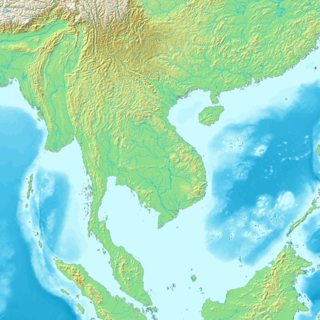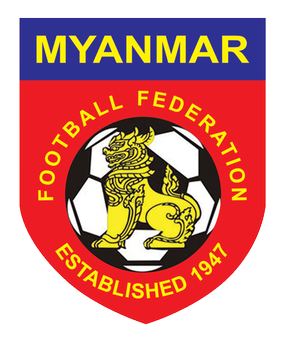
Mainland Southeast Asia, also known as Indochina or the Indochinese Peninsula, is the continental portion of Southeast Asia. It lies east of the Indian subcontinent and south of Mainland China and is bordered by the Indian Ocean to the west and the Pacific Ocean to the east. It includes the countries of Cambodia, Laos, Myanmar, Thailand, Vietnam, and the peninsular portion of Malaysia.

SEA Games, officially known as the South East Asian Games and abbreviated as SEAG, is a biennial multi-sport event involving participants from the current 11 countries of Southeast Asia. The games are under the regulation of the Southeast Asian Games Federation with supervision by the International Olympic Committee (IOC) and the Olympic Council of Asia (OCA).

The 1959 Southeast Asian Peninsular Games, officially known as the 1st Southeast Asian Peninsular Games, was the first and inaugural edition of the biennial multi-sport event for Southeast Asian athletes, organised by the SEAP Games Federation. It was held in Bangkok, Thailand from 12 to 17 December 1959 with 12 sports featured in the games. Cambodia, one of the six founding members of the SEAP Games Federation, did not compete at the inaugural edition. For the first time and first among all Southeast Asian nations, Thailand hosted the Southeast Asian Peninsular Games, which later known as the Southeast Asian Games. The games was opened and closed by Bhumibol Adulyadej, the King of Thailand at the Suphachalasai Stadium. The final medal tally was led by host Thailand, followed by its neighbouring countries, Burma and Malaya.

The 1961 Southeast Asian Peninsular Games, officially known as the 2nd Southeast Asian Peninsular Games, was a Southeast Asian multi-sport event held in Rangoon, Burma from 11 to 16 December 1961 with 13 sports featured in the games. This was the first time all six founding members of the SEAP Games Federation competed in the biennial sports festival and the first time Myanmar, then known as Burma hosted the games. Burma, later known as Myanmar is the second country to host the Southeast Asian Peninsular Games, which later known as the Southeast Asian Games after Thailand. The games was opened and closed by Win Maung, the President of Burma at the Bogyoke Aung San Stadium. The final medal tally was led by host Burma, followed by Thailand and Malaya.

The 1965 Southeast Asian Peninsular Games, officially known as the 3rd Southeast Asian Peninsular Games, was a Southeast Asian multi-sport event held in Kuala Lumpur, Malaysia, from 14 to 21 December 1965 with 14 sports featured in the games. Originally to be hosted by Laos, the third edition of the games was hosted by Malaysia after the former was not able to honour its hosting commitment citing financial difficulties and would later known to have hosted the 2009 Southeast Asian Games decades later. Two years earlier, the third SEAP Games was cancelled as Cambodia pulled out of hosting the event due to internal strife. This was the first time Malaysia host the games. Malaysia is the third country to host the Southeast Asian Peninsular Games, which later known as the Southeast Asian Games after Thailand and Myanmar, then Burma. The games was opened and closed by Ismail Nasiruddin, the King of Malaysia at the Stadium Merdeka. The final medal tally was led by Thailand followed by host Malaysia and Singapore.

The 1969 Southeast Asian Peninsular Games, officially known as the 5th Southeast Asian Peninsular Games, was a Southeast Asian multi-sport event held in Rangoon, Burma from 6 to 13 December 1969 with 15 sports featured in the games. Republic of Vietnam had reluctantly declined to host this edition because the attack of the North Vietnam in 1968. Singapore, the youngest member of the SEAP Games Federation at the time, suggested in this edition of the games to change the name of the sports festival to the Southeast Asia Games. Although it was not officially stated, the inclusion of the Philippines and Indonesia in the expanded federation was to greatly help alleviate the hosting problems, as well as to set higher and more competitive standards in the games. After hosting the 5th edition, Burma declined hosting succeeding games due to lack of financial capability. This was Burma's second time to host the games and its first time since 1961. The games was opened and closed by Ne Win, the Prime Minister and Chairman of Union Revolutionary Council of Burma at the Bogyoke Aung San Stadium. The final medal tally was led by host Burma, followed by Thailand and Singapore.

The 2009 Southeast Asian Games, officially known as the 25th Southeast Asian Games, was a Southeast Asian multi-sport event hosted by Vientiane, Laos. This was the first time Laos had held the Southeast Asian Games as Laos had previously declined hosting the 1965 Southeast Asian Peninsular Games, citing financial difficulties. This was also the first time the Southeast Asian Games was held in a landlocked country.

The ASEAN Para Games is a biennial multi-sport event held after every Southeast Asian Games involving disabled athletes from the current 11 Southeast Asia countries. Participating athletes have a variety of disabilities ranging from spastic, cerebral palsy, mobility disabilities, visual disabilities, amputated to intellectual disabilities. The ASEAN Para Games is under the regulation of the ASEAN Para Sports Federation (APSF) with supervision by the International Paralympic Committee (IPC) and the Asian Paralympic Committee and is traditionally hosted by the country where the Southeast Asian Games took place.

The 2013 Southeast Asian Games, officially known as the 27th Southeast Asian Games, or the 27th SEA Games, and commonly known as Naypyitaw 2013, was a Southeast Asian multi-sport event took place in Nay Pyi Taw, Myanmar from 11 to 22 December 2013, Around 4730 athletes from 11 participating nations competed at the games, which featured 460 events in 34 sports. The games were held from 11 to 22 December 2013.
The aquatics events at the 2007 Southeast Asian Games included swimming, diving and water polo. The events were held at the Aquatic Center, His Majesty the King's 80th Birthday Anniversary Stadium, Nakhon Ratchasima, Thailand.

The Myanmar women's national football team is a female association football team representing Myanmar and is controlled by Myanmar Football Federation (MFF).
The Singapore national under-23 football team is the national under-23 association football team of Singapore. The team comes under the organisation of the Football Association of Singapore (FAS).
The traditional martial arts of the Mainland Southeast Asia are related to one another, and as a group to Indian martial arts. The most salient common feature is Mainland Southeast Asia kickboxing. The region of Mainland Southeast Asia is believed to be the land of Suvarnabhumi that ancient Indians mentioned in Buddhist text and Hindu text. In 790 A.D., a Khmer prince who grew up abroad by the name of Jayavarman II returned to unify the Khmer civilization. In 802 A.D., Jayavarman II established the Khmer Empire, the precursor to modern Cambodia, and declared himself the Chakravatin. Around 850 A.D., Pagan, the ancestor of modern-day Burma, was established by Tibeto-Burman speakers. For 200 years, Pagan remained a small principality until the reign of King Anawrahta. In 1238 A.D., Thailand's first state, Sukhothai, was started when the residents declared independence from the Khmer Empire. In 1353 A.D., Laos's first state, Lan Xang, was started by Fa Ngum with the assistance of the Khmer from Angkor.

The Myanmar national under-22 football team is the under-23 football team that represents Myanmar at the international football competitions. It is controlled by the Myanmar Football Federation.
Badminton at the 2015 Southeast Asian Games is held in Singapore Indoor Stadium, in Kallang, Singapore from 10 to 16 June 2015. Seven competitions were held in men and women's singles and in men, women and mixed's doubles and in men and women's team.
Tennis at the 2015 Southeast Asian Games was held in Kallang Tennis Centre, in Kallang, Singapore from 6 to 14 June 2015.
Sepak takraw at the 2015 Southeast Asian Games was held at EXPO Hall 1, Singapore from 6 to 15 June 2015.
Sepak takraw at the 2017 Southeast Asian Games was held in Titiwangsa Indoor Stadium, Kuala Lumpur from 16 to 29 August 2017.
Tennis at the 2017 Southeast Asian Games was held in the National Tennis Centre, Jalan Duta from 21 to 26 August 2017.

Malaysia started sending athletes to the Southeast Asian Games in 1959 as a Founding member of the Southeast Asian Games Federation (SEAGF) alongside Burma, Kampuchea, Laos, Thailand, and the Republic of Vietnam. Later, Malaysia tendered a suggestion to expand the Southeast Asian Peninsula (SEAP) Games Federation by inviting other Southeast Asian countries such as Brunei, Indonesia, and the Philippines. These three new members were officially welcomed into the Federation on 5 February 1977. The 1977 Southeast Asian Games in Kuala Lumpur becomes the first games that bear the title Southeast Asian Games.











